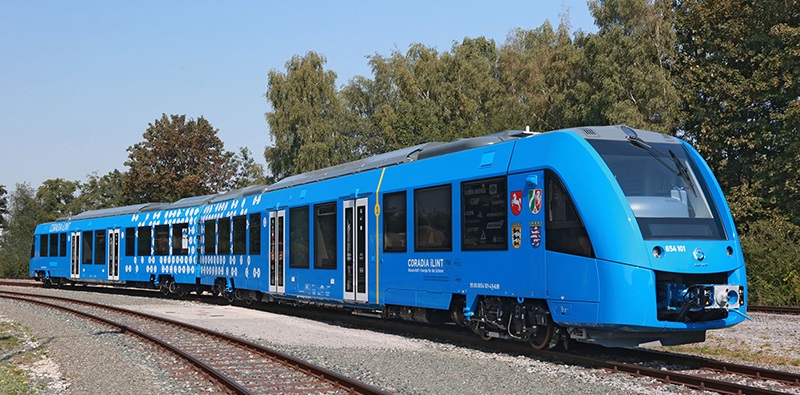
New report: Hydrogen trains needed to eliminate harmful emissions on non-electrified lines
Institution calls for urgent action to introduce hydrogen trains in areas outside the electrified rail network.
Investment in hydrogen trains is a vital part of the process to improve air quality, but must not be seen as an easy replacement for electrification schemes, according to a new report by the Institution of Mechanical Engineers.
Hydrogen, which can be used as an alternative for fossil fuels only producing water as waste emission at the point of use, is a clean technology that can help decarbonise the railway industry.
Around 29% of Britain’s fleet currently run only on diesel fuel which emits large concentrations of particulate matter, known to be damaging to our health, particularly at enclosed stations.
However, the report emphasises that hydrogen trains could be seen as a solution by Government to avoid expensive electrification schemes, but stresses that hydrogen trains should only be seen as an option where electrification is not the most economical or technically viable, for example on rural routes.
Furthermore, the report explains why hydrogen is not suitable for freight and high-speed trains because it requires a large amount of storage space.
The report builds on the findings of the Institution’s A Breath of fresh air: New solutions to reduce transport emissions, which called for a Clean Air Act to help the 71% of local authorities which missed their 2017 air quality targets.
Dr Jenifer Baxter, Head of Engineering at the Institution of Mechanical Engineers, said:
“The Government has set out plans to phase-out the use of diesel-only trains by 2040 in order to reduce carbon emissions, but less than 50% of the network is electrified and the remaining half is unlikely to ever completely become so, particularly given the cancellation of three schemes in the North, the Midlands and Wales.”Creating hydrogen clusters, a collection of businesses associated with the hydrogen industry, around where hydrogen is produced could help local transport systems in the UK’s regions to decarbonise. Trains and buses which operate near industries where hydrogen is produced could use hydrogen as a fuel, as production, storage and refuelling would be nearby, thereby reducing fuel distribution and transport costs.”
David Shirres, Member of the Institution’s Railway Division, said:
“Until recently, diesel engines were the only practicable option for self-powered rail vehicles. Yet diesel fumes in city centres are becoming increasingly unacceptable as shown by proposals for ultra low emission zones as well as the Government’s call to remove diesel-only trains by 2040.
“The recent introduction of a hydrogen powered trains on rural routes in Germany offers a solution which needs further development for operation in the UK. However, storing hydrogen requires significantly more space than diesel fuel. For this reason, hydrogen is not suitable for high-powered rail traction and so should not be considered as an alternative to electrification.”
The Future for hydrogen trains in the UK”recommends three priority areas for action:
- That the UK Government rethinks the cancellation of electrification programmes and moves forward with a more innovative, and long-term approach, electrification rolling programme, that can create skills and careers, develop supply chains, and work with existing rail networks to manage projects.
- That the industry encourages the development and deployment of hydrogen trains and their fuelling and servicing facilities. Creating and supporting demonstration lines and trains will help to de-risk the technologies and servicing relating to hydrogen fuels and trains.
- That hydrogen train technology is developed in industrial areas where hydrogen production already occurs, and can support the wider transport system. For example, as well as local trains, local hydrogen buses could be refuelled at an industrial site, and hydrogen could also be pumped into the gas grid to help decarbonise heat. Both the North West and the North East could support test beds. These test beds will support knowledge sharing across sectors, providing cost reductions in hydrogen fuel.
Contact the Institution of Mechanical Engineers’ Press Office on 020 7973 1261 or email [email protected]
The Institution of Mechanical Engineers was established in 1847 and has some of the world’s greatest engineers in its history books. It is one of the fastest growing professional engineering institutions. Headquartered in London, we have operations around the world and over 120,000 members in more than 140 countries working at the heart of the most important and dynamic industries such as the automotive, rail, aerospace, medical, power and construction industries. www.imeche.org
Source: IMECHE
Read the most up to date Fuel Cell and Hydrogen Industry news at FuelCellsWorks




